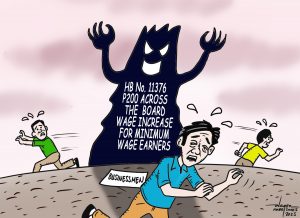NAAWAN, Misamis Oriental (MindaNews) – Rice is the very core of our food security. It’s all right for meat or fish to disappear from our table, but the absence of rice is poverty at its worst. Thus, rice has always been a political issue.
President Ferdinand “Bongbong” Marcos Jr. vowed to bring the price of rice to P20 per kilo once elected. He has been in office for nearly two years, yet, instead of going down, the price of rice has spiraled to no end. Moreover, the administration is recently shamed by the corruption at the National Food Authority where 75,000 sacks of government rice buffer stocks were sold to private traders at prices to the great disadvantage of the government.
Cathy Estavillo of Bantay Bigas, said that, currently, the retail price of rice in some areas reached as high as P70 per kilo.
Even in rice-growing provinces, the price of rice plays, accordingly, at P60 to P65 per kilo.
Ideally, the retail price of rice is only double of the farm gate of palay (unmilled rice). Based on the December 2023 average farm gate of P22.98 across the country, the retail price may hover around P46-P60/kg after factoring the cost of milling, packaging and transport. Higher variation is affected by milling quality, location of sale, and the margin determined by market sellers.
It’s ironic but the farm gate price of palay, whether in good or bad harvest, is dictated by rice traders or buyers, (and) not by the farmer-producers. Generally, this unpalatable situation has developed because the traders have invested in the enterprise of the farmers via loans for farm inputs, such as farm implements, fertilizers, pesticides, fuel and loans to meet family needs – food, education, baptism, wedding and similar social concerns. The farm gate price of palay is fettered by debt coercion.
Also, the trader-millers more often dictated the price of rice that reach the market sellers. Unreasonable price increases or fluctuations may be experienced when rice cartels hoard or control the flow of rice to the market.
The prices of basic commodities are, supposedly, governed by the law of supply and demand. But greed has long ago undermined this law. It is now ineffective. Greed names the price.
The demand for rice is constantly growing, alongside our vigorously growing population. Thus, over time supply may plunge ocean deep, while price may spiral sky high.
(MindaViews is the opinion section of MindaNews. William R. Adan, Ph.D., is retired professor and former chancellor of Mindanao State University at Naawan, Misamis Oriental.)




